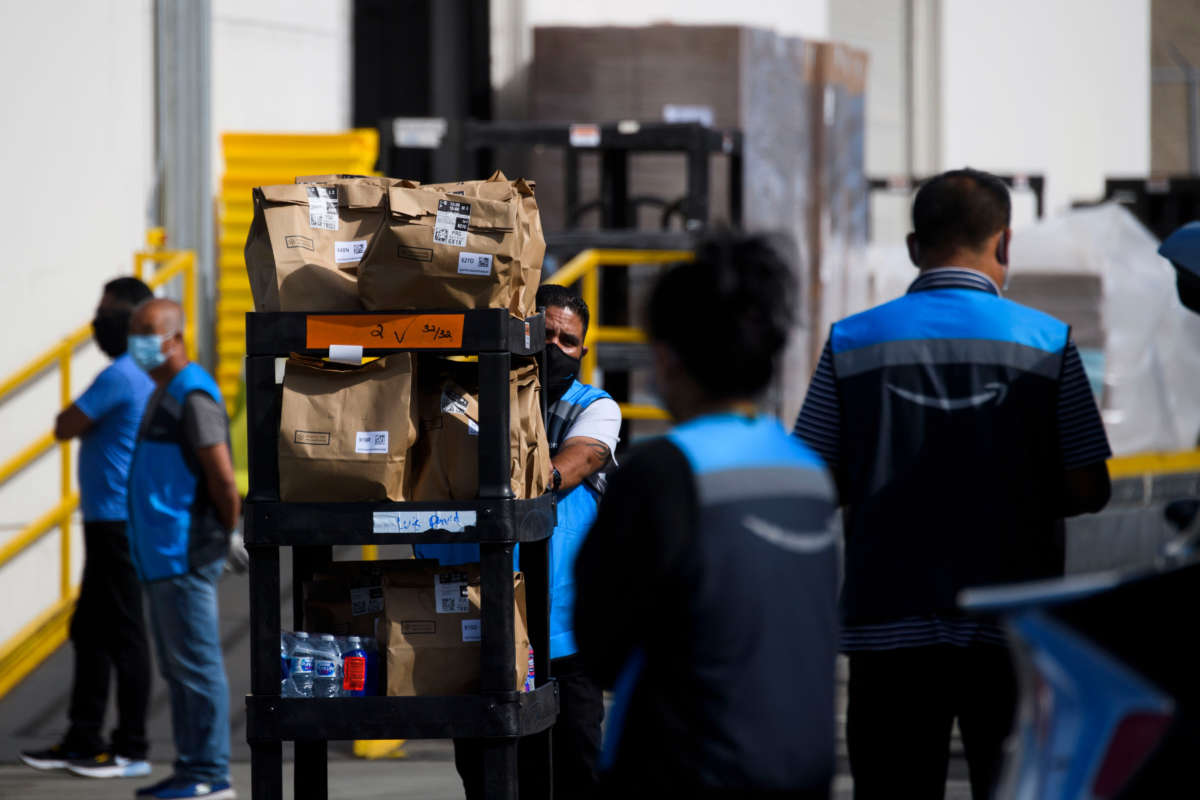On Tuesday, the Federal Trade Commission (FTC) announced that it will be fining Amazon $61.7 million for using drivers’ tips to pay their salary for over two and a half years.
“Today, the FTC is sanctioning Amazon.com for expanding its business empire by cheating its workers,” said FTC Commissioner Rohit Chopra in a statement. “The Commission’s complaint charges that the company secretly began cutting its payments to drivers, and siphoning their tips to make up the difference. In total, Amazon stole nearly one-third of drivers’ tips to pad its own bottom line.” The FTC has ordered that the $61.7 million go back to the workers who were shorted pay.
The drivers were employed through Amazon’s Flex service, a package delivery service that was meant to compete with FedEx and UPS in 2015. The workers, who are contractors and not employees, were sold a job with competitive pay: Amazon promised to pay them $18 to $25 an hour, plus 100 percent of the tips that they received. But instead, Amazon used the tips to pay the drivers their base pay, shorting them of tips in order to save themselves millions.
Get our free emails
Chopra called the scheme a “bait-and-switch” in which Amazon recruited enough workers to drive for the holiday season, pocketed the tips and then kept the drivers from seeking other employment by misleading them about the pay.
The company evidently stopped the practice after reporters uncovered the scheme. In 2019, the L.A. Times printed one driver’s account of the tip shorting. “In one case, a driver who was assigned to deliver an order to his own home tipped himself $12,” wrote Johana Bhuiyan of the L.A. Times. The guaranteed minimum base pay for the order was $27. The driver received $30 in compensation for the order, which the company said included 100 percent of the tip — showing that Amazon contributed only $18.”
Drivers had at one point begun to catch on to what the company was doing. But, when they contacted Amazon about it, the FTC says, they received a canned response in which the company continued to perpetuate the misleading statement that it was providing them with “100 percent of customer tips” — not explaining that Amazon wasn’t providing 100 percent of what they had promised they’d pay.
Chopra said that he hopes that this will mark a turning point for the FTC. “The Commission has historically taken a lax approach to worker abuse, entering no-consequences settlements even in naked wage-fixing matters that are criminal in nature. Despite broad pronouncements about a commitment to policing markets for anticompetitive conduct that harms workers, the FTC has done little. I hope that today’s action turns the page on this era of inaction.” President Joe Biden has nominated Chopra to be the director of the Consumer Financial Protection Bureau.
With this, Amazon joins a cabal of tech companies that have allegedly treated their gig workers this way. Instacart and Doordash also have apparently been found to be shorting their drivers using a similar method. But not only was Amazon reportedly shorting its drivers’ pay, it was also spying on its Flex workers’ social media accounts, Motherboard reported last year. According to Motherboard, Amazon used an online platform to monitor if any drivers were talking about protests or strikes against the company.
Among Tuesday’s news about Amazon CEO Jeff Bezos stepping down later this year to become an executive chair was also a report that the company is intensifying a “severe” effort to bust a union effort in their warehouse in Alabama, the Guardian reported. “When it comes to this union busting, it’s severe. We’ve never seen anything like it on this level,” an organizer with the union told the outlet.
Speaking against the authoritarian crackdown
In the midst of a nationwide attack on civil liberties, Truthout urgently needs your help.
Journalism is a critical tool in the fight against Trump and his extremist agenda. The right wing knows this — that’s why they’ve taken over many legacy media publications.
But we won’t let truth be replaced by propaganda. As the Trump administration works to silence dissent, please support nonprofit independent journalism. Truthout is almost entirely funded by individual giving, so a one-time or monthly donation goes a long way. Click below to sustain our work.
